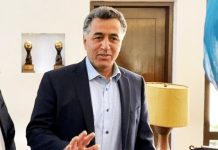ISLAMABAD: Pakistan is seeking an integrated economic package from China envisaging financial support, increase in trade and investment and cooperation in agricultural research and will go ahead with an arrangement with the International Monetary Fund (IMF) among various other funding avenues.
Announcing this at a joint news conference after a meeting of the federal cabinet, Finance Minister Asad Umar said the financing support package from Riyadh was not based on any conditions, adding that Pakistan would stand behind Saudi Arabia under difficult circumstances. He was accompanied by Power Minister Omar Ayub Khan and Information Minister Fawad Chaudhry.
The finance minister also formally announced an increase in power tariff after cabinet approval and responded to criticism over ‘indecisiveness and lack of planning’ of the Pakistan Tehreek-i-Insaf (PTI) government over the past two months. He said it would have been easier to request for an IMF bailout and increase utility prices at the outset like previous governments, but that was not what his party had promised before coming to power.
“Instead, we have been planning since day one in office and working on various sources [to secure funds] and we are still working on multiple avenues and not only the IMF; but it would become clear in the days to come how much support is required from the IMF when we enter into formal dialogue by Nov 7.”
The minister said more than the amount of the loan, the IMF engagement was important to access international capital market for bonds, enable flows from the Asian Infrastructure Investment Bank, World Bank and Asian Development Bank and encourage foreign direct investment.
Responding to questions about the Saudi financial bailout, Mr Umar said there was no truth in concerns expressed by the opposition and others that Pakistan might have to accept some demands in return for the bailout package. “The Saudis did not make any demands that we refused to meet, they made no demands,” he said, adding that “Pak-Saudi relations are based on love and have nothing to do with any government”.
 “It is a people-to-people connection. They will stand by Pakistan’s side during our time of need and they know we stand by them when they need [us].”
“It is a people-to-people connection. They will stand by Pakistan’s side during our time of need and they know we stand by them when they need [us].”
He said there was no direct link between Saudi Arabia and the China-Pakistan Economic Corridor that was a strategic mutual arrangement between Pakistan and China. But there are projects emerging out of the CPEC for which Saudi Arabia has been requested (to invest) with prior discussions with China, and others could also join such projects.
He said Pakistan would play the role of a bridge to promote peace, harmony, unity and friendship among the Muslim Ummah and it could not become part of any conspiracy.
Power tariff
The finance minister said the power sector suffered Rs453bn loss last year and was set to face Rs550bn loss this year, which would ultimately result in tariff increase, debt accumulation or inflation.
Therefore, the Economic Coordination Council of the cabinet discussed over many meetings how to avoid Rs3.82 per unit increase determined by the National Electric Power Regulatory Authority in August.
He said Power Minister Omar Ayub Khan and his ministry had committed Rs140bn target for the current year to secure from reducing theft and technical losses and improving recoveries and efficiencies.
He said because of this commitment, the government allowed Rs1.27 per unit average increase in tariff and still remained within the Rs105bn budgeted subsidy.
While increasing the tariff, he claimed, the government had protected domestic consumers of less than 300 units monthly consumption, along with export sector and reduced rates for agricultural tubewells. There are 1.76 million consumers utilising 300 units on monthly basis.
This, Mr Omar said, was the cornerstone of the PTI (government’s) policy to support export and agriculture sector and encourage remittances from abroad to ensure that this be the last IMF programme and at the same time protect poor and lower strata of society from adverse impacts of difficult economic conditions to a level possible.
Omar Ayub said the power division would save Rs50-60bn by reducing inefficiencies besides ensuring maximum recoveries from overdue bills that currently stood between Rs850 and Rs900bn.
He said the anti-theft drive would be launched from Lahore on Saturday in high theft areas. “We are beginning with big fish and then will go down”, Mr Khan said, adding that the campaign would be extended to Khyber Pakhtunkhwa, Balochistan and Sindh over the next few days. He said people involved in theft and non-payments still had two days to correct themselves otherwise they would face heavy fines and imprisonments.
The tariff sheet released by the power minister showed 10 per cent increase in rates for 301-700 units and 15pc for more than 700 units. Likewise, consumers having three-phase meters (above 5kw) would also face 15pc increase.
Commercial consumers on sanctioned load above 5kw would face 23pc increase in regular meters, 20pc on peak timings and 25pc in off-peak times.
The chart showed an increase of 5 to 6.5pc in the rates of all industrial consumers without any exception, even including export sector, despite the claim by the two ministers that their rate had been fixed at 7.5 cents (Rs9.75) per unit in continuation of the previous government’s decision.
Various bulk supply consumers would face an increase of 25pc while agriculture consumers under Scarp scheme would face a raise of 31pc from Rs12 to Rs15.68 per unit. The rates for other agricultural tubewells would remain unchanged at Rs5.35pc unit.
Official passport for NAB officers
The information minister said the cabinet had decided to grant “official passports” to officials of the National Accountability Bureau to facilitate them in foreign visits and bringing back thieves from anywhere in the world.
PPP leader Nayyar Bokhari termed the decision a move to bribe NAB officers.



